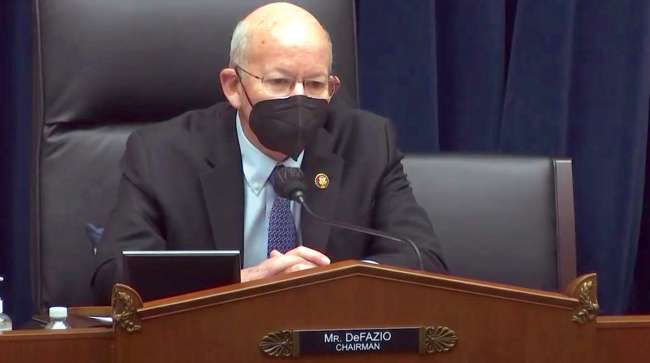Senior Reporter
House Panel Advances Guidance on Biden COVID-19 Proposal

[Ensure you have all the info you need in these unprecedented times. Subscribe now.]
Emergency aid for the transit and aviation sectors was approved in legislation advanced by the transportation committee in the U.S. House of Representatives Feb. 10.
The legislation, backed mostly by Democrats on the committee, drew criticism from Republicans who are concerned about ensuring there is sufficient funding for the measure.
The proposal allocated $50 billion to the Federal Emergency Management Agency’s Disaster Relief Fund, which provides reimbursement to state, local, tribal and territorial agencies tasked with responding to COVID-19 efforts.
The legislation also calls for about $30 billion for transit operations, $8 billion for airports and $1.5 billion for Amtrak. It would also provide $3 billion for the Economic Development Administration, and $3 billion for aerospace manufacturing.
On trucking policy, Rep. Mike Bost (R-Ill.) withdrew an amendment meant to enhance nationwide parking options for truck drivers during a hearing on the measure. The congressman, as well as several of his colleagues on the panel, pledged to review concerns related to truck parking in the near future.
The transportation committee is among the legislative panels tasked with considering parts of President Joe Biden’s nearly $2 trillion COVID-19 pandemic relief proposal. The proposal now moves to the Budget Committee, which will soon put together a complete package.
“This plan can make a real difference in people’s lives,” said transportation committee Chairman Peter DeFazio (D-Ore.) “Amtrak will be able to recall workers and restore long-distance service. Small- and minority-owned businesses will be able to keep the lights on at airports around the country. Tens of thousands of airline workers won’t fear losing their paycheck and benefits in a matter of weeks. Buses and trains can keep running and operators will be protected with [personal protective equipment]. We can replenish our nation’s Disaster Relief Fund — the list goes on.”
Speaker of the House Nancy Pelosi (D-Calif.) praised her Democratic colleagues’ “imagination and intellect” in moving the bill along.
“We hope to have this all done by the end of February,” said Pelosi Feb. 11. “I’m particularly interested in how women are affected by the pandemic, but also by this legislation. Over 2.3 million women have been forced to leave the workforce entirely, including 1 million moms. That’s why this bill is so important because it has such strong commitment to child care so that parents, moms and dads, are able to go to work.”
The measure advanced through a process known as budget reconciliation, which requires only a simple majority to proceed and which cannot be delayed through congressional filibuster. Senate Democrats hold a 50-50 majority with Vice President Kamala Harris serving as the tie-breaking vote. The process is meant to speed certain types of bills through the legislative process.
If approved by both the House and Senate, the emergency relief package would advance to the White House for enactment.
Top Republicans on the panel pushed back on the use of the reconciliation tactic, criticizing Democrats for using the approach just weeks after Congress approved a major COVID-19 rescue package.
“The most appropriate course of action would be to ensure that the money we’ve already approved actually gets into the hands of its intended recipients before we approve trillions [of dollars] more in new spending,” said Republican Rep. Sam Graves of Missouri, the transportation panel’s ranking member. “I want to be clear that if more assistance is needed, then I remain committed to working with my colleagues to provide it. This should be done in a bipartisan fashion, to ensure we’re being good stewards of taxpayer dollars.”
Graves’ concerns are shared by Senate Minority Leader Mitch McConnell (R-Ky.).
“Even though we are still pushing out $900 billion in relief that Congress passed less than two months ago… even though a group of Senate Republicans met with President Biden to discuss bipartisan avenues for hundreds of billions of dollars more… Washington Democrats have decided they want to go it alone,” McConnell said.
COVID by Transport Topics on Scribd
For the Biden White House, connecting sectors with greater access to emergency aid has remained a priority. The president continues to insist on the need for enhancing vaccination programs, as well as boosting connectivity via transit systems. Additional emergency aid is desperately needed, he argues. “I think we’re in a position to think big and move big, and to move in a direction that can not only get the economy back on its feet, but we have to get people well before we get people on their feet,” Biden said Feb. 9. “And we’ve focused a lot of the attention on making sure that we deal with the coronavirus, get it under control.”
Want more news? Listen to today's daily briefing below or go here for more info:




